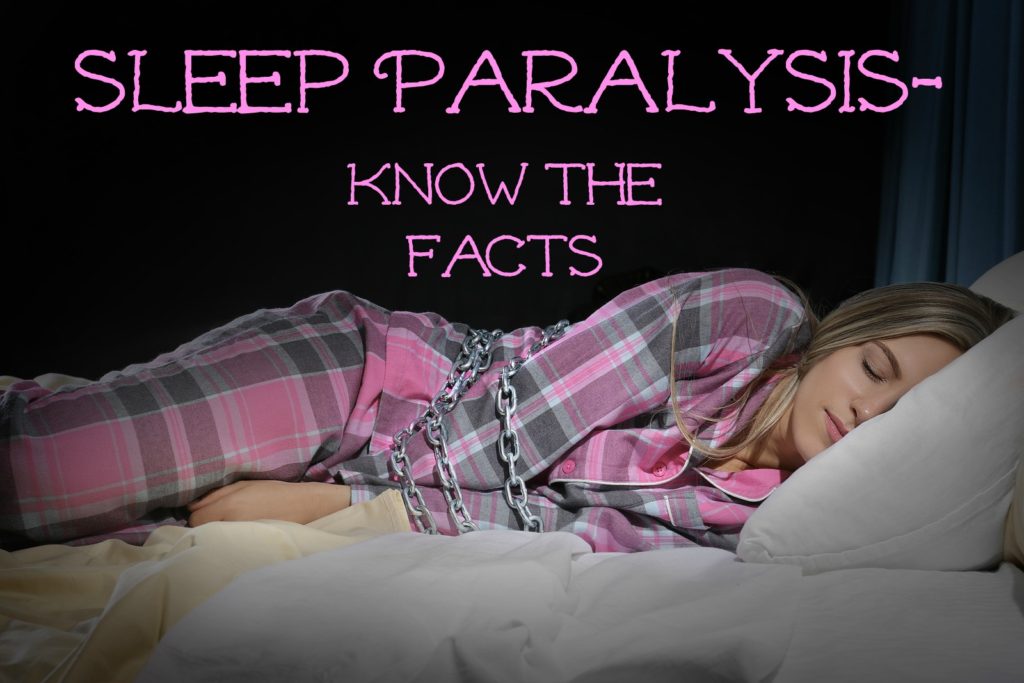Sleep paralysis is a sleep disorder that can be quite unsettling for the sufferer. It causes a person to pass between consciousness and sleep with the inability to speak or move. The sufferer may feel as though someone is in the room with them which leads to fear and panic and feeling as though they are choking and cannot breathe.

Sleep paralysis can occur either shortly before falling asleep or during awakening. If it occurs as you are falling asleep it is called hypnagogic or predormital sleep paralysis. If it occurs after, it is referred to as hypnopompic or postdormital sleep paralysis. When experiencing predormital sleep paralysis, the sufferer remains alert as the body descends into REM sleep. With postdormital sleep paralysis, the sufferer clicks into alertness prior to completing the REM stage upon waking. In either case, the process can last anywhere from a few seconds to several minutes.
Up to as many as four out of every 10 people will experience sleep paralysis in at least one of its forms. It is most commonly noted in the teen and young adult years, however, men and women of any age can experience it. Typically, the condition will only happen once or twice in a person’s lifetime, but for some, it can occur on a more regular basis- this is referred to as isolated sleep paralysis.
Though sleep paralysis can occur on its own, it is more often a side effect of another problem such as:
- Narcolepsy (sudden episodes of sleep)
- Cataplexy (sudden loss of muscle feeling)
- Hypnopompic and hypnagogic hallucinations
- Insomnia or a lack of sleep
- Sleeping on your back
- Sudden change in sleep environment
- Mental conditions like high levels of stress and bipolar disorder
- Substance abuse
Though the experience may be scary, it is not considered a serious medical condition. The worst that can come from it is that it may leave the sufferer feeling anxious and scared to sleep in case it should happen again. Most people will experience a solitary episode of sleep paralysis, so medical treatment is not necessary. However, for those that experience sleep paralysis on a more frequent basis, seeking help from a certified sleep technician or a doctor should be their first priority- mainly because of the other disorders that are often associated with the problem. Treating the underlying cause of the condition will help stop sleep paralysis in its tracks. Other ways to help control sleep paralysis include:
- Improving your sleep hygiene. Get the recommended amount of sleep each night and keep to a schedule.
- Not sleeping on your back. This can be hard to achieve, as you can’t exactly control your body while you sleep. Try falling asleep on your side, as sleep paralysis often happens when you are just falling asleep. You could also try placing pillows behind your back to keep from rolling onto it.
- Making time to relax before bed. Clear your head of worrying thoughts. Stress can cause you to experience sleep paralysis so try a relaxation technique, bedtime yoga, or writing your worries out in a journal before you settle in for the night.
- Seeing a doctor. If several occurrences of sleep paralysis have you worried, speak with a doctor or specialist. Consider keeping a sleep diary before your appointment to better help your doctor determine if your problem is linked to something more serious like Narcolepsy.
People who experience sleep paralysis regularly may eventually learn to control it and how to end the encounter sooner rather than later. It is important to remember that though it can be unsettling, sleep paralysis is no danger to you, and it will soon be over. If you suffer from sleep paralysis regularly, and you find that it is diminishing your sleep quality and negatively impacting your waking life, consider scheduling an appointment at one of the Valley Sleep Center’s five convenient locations for a sleep consultation with one of our board-certified sleep physicians today.

